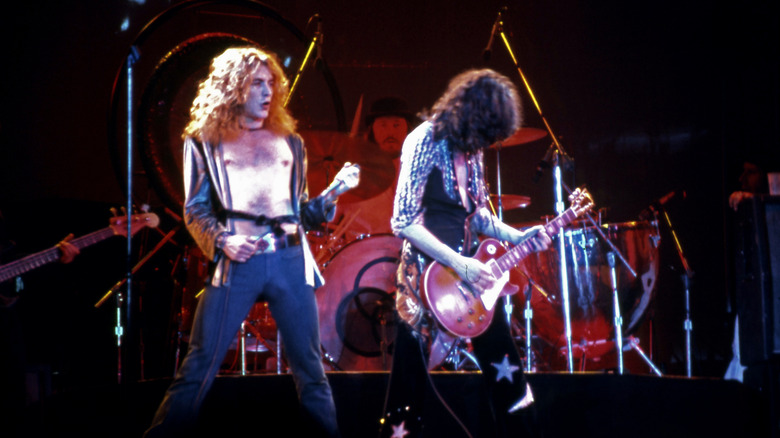12 Of The Greatest Songs Based On Historical Events
Songwriting and storytelling are two very distinct skills, and it is the rare artist who is capable of writing a song that also functions as a narrative. Sure, there are some folks who have pretty much made this their bread and butter; everybody knows, for instance, that the likes of Jim Croce and Bob Dylan could spin some pretty good musical yarns, and a handful of rap artists such as Ice-T and Slick Rick have also hung their Kangols on their storytelling skills. The best of these tunes can paint us a picture as vivid as any conjured up by a prose writer — and they can also bring just as much tension and drama, as evidenced by the tons of story songs where someone dies at the end.
If weaving a fanciful tale with musical accompaniment takes a lot of creative juice, though, then consider how much of that stuff it must take to entertainingly and at least somewhat accurately teach a history lesson. There are some great tunes that don't just tell a story — they are, as they say in Hollywood, based on true stories, many of which are among the most significant events of our time.
99 Luftballons by Nena
An international smash hit in 1984, "99 Luftballons" from German rockers Nena was a poetic, rather than literal, examination of the post-World War II era — the Cold War, during which all of the nations of the world watched anxiously to see what would happen in the decades-long staring contest between the United States and Soviet Union. The decade would, of course, eventually see better relations between the two superpowers and the threat of nuclear war subside, but Nena's tune imagined an all-too-plausible scenario: harmless balloons, floating on the horizon, triggering an all-out global conflict after being mistaken for something more sinister.
The song was written by Nena's guitarist, Carlo Karges, while attending a Rolling Stones concert in West Germany; when a slew of balloons were released from the stage, that very scenario just popped into his head, as he imagined a stray balloon wandering over the Berlin Wall. The original German lyrics are clear about the perceived nature of the threat: The balloons are "taken for UFOs from space," and finding only balloons after being scrambled to intercept them, the military responds with a show of force ("a great display of fireworks") that sets off World War III. The English version, "99 Red Balloons," relates the events a bit more ambiguously, but the end result is the same: With the world in ruins, the narrator happens upon a single balloon, and lets it fly. Interestingly, while both versions' videos received tons of play on MTV, the original release was a No. 2 hit in the U.S., while the English version failed to chart.
The Longest Day by Iron Maiden
In 1959, author and journalist Cornelius Ryan wrapped up a solid decade of research and writing by publishing "The Longest Day," a fictional account of the pivotal World War II battle known as D-Day. Ryan's work served as the basis for a 1962 film of the same name, which starred John Wayne and Richard Burton and won two Oscars on a total of five nominations. Music fans of a certain stripe, however, might argue that this was not the definitive interpretation of Ryan's work, and that the honor belongs not to any film, but to a song. That stripe: Metalhead. That song: "The Longest Day" by the legendary British band Iron Maiden.
The tune appeared on the band's 2006 album "A Matter of Life and Death," and its lyrics, which careen between first, second, and third-person accounts of the carnage, are of course metal as hell. "To the edge of the wire / And we rush with the tide / Oh, the water is red / With the blood of the dead," the soldier on the beach laments. "Your number's up / The bullet's got your name / You still go on / To Hell and back again," the angel (or perhaps devil) on his shoulder whispers in his ear. "The world's alight / The cliffs erupt in flame / No escape / Remorseless shrapnel rains," the omniscient narrator observes. It is a visceral work, masterfully evoking the chaos of one of the most consequential battles in history — and unlike, say, "Saving Private Ryan," you can bang your head to it.
Veracruz by Warren Zevon
The great Warren Zevon was a singular talent in many ways. His ragged baritone was like no other voice in rock, his skills as a songwriter and lyricist were without equal, and his subject matter tended toward ... well, toward the really weird. His 1978 breakthrough album, "Excitable Boy," was full of interestingly bizarre stories — of ghostly mercenaries bent on revenge ("Roland the Headless Thompson Gunner"), Chinese food-loving creatures of the English night ("Werewolves of London"), and murderous prom dates (the title track). But one stood out from the pack for its historical value: "Veracruz," an account of the 1914 occupation of the Mexican port city told from the point of view of one of its anonymous residents, forced to flee in the midst of the conflict between the U.S. military and the forces of Mexican president Victoriano Huerta.
"I heard Woodrow Wilson's guns / I heard Maria crying," Zevon sings. "Late last night I heard the news / That Veracruz was dying." He describes the unfortunate plight of those forced to exit the city, leading to a Spanish refrain penned by his guitarist Jorge Calderon, which translates in part, "On that day I swore / To the port I would return ... In Veracruz I will die." It's a moving, empathetic rumination on an event that remains a sore spot for residents of Veracruz to this day.
P.L.U.C.K. by System of a Down
In 1915, there were around two million people of Armenian descent living in Turkey. In 1922, some four years after the fall of the ruling Ottoman Empire, there were fewer than half a million. What happened in between involved the kinds of things — mass graves, death marches, concentration camps — that one usually associates with brutal regimes like the Nazis. Today, historians mostly agree that what happened to the Armenian population of Turkey — which was subjected to religious and political persecution by the Ottomans — constituted a genocide.
The continued resistance to describing it as such amongst world leaders raised the ire of the legendary Armenian-American heavy metal band System of a Down, who vented the entirety of their fury about the genocide on the track "P.L.U.C.K." (an acronym for "Politically Lying Unholy Cowardly Killers") from their 1998 self-titled debut album. Most of the lyrics are too graphic or profane to reprint, but in a 2021 sitdown with The Guardian, frontman Serj Tankian explained that he wrote the song to keep a promise he made to his grandfather to "always work to have his history properly recognized by the country he died in, the United States." In 2019, after decades of lobbying by activists, political organizations, and at least one heavy metal band, the U.S. government passed a resolution acknowledging the genocide.
Ohio by Crosby, Stills, Nash, and Young
On May 4, 1970, one of the most shameful events in the history of American protest — and there are more than a few of those — took place at Kent State University in Kent, Ohio. Then-president Richard Nixon, who had been elected in part because of his stated tendency toward ending the Vietnam War, had just escalated the conflict by invading Cambodia, and at Kent State, a throng of student activists were gathered in opposition to the action. The National Guard was called in to put down the protest, and they did so not with tear gas or bullhorns, but with bullets. From hundreds of feet away, guardsmen opened fire on the crowd, killing four unarmed students and relegating themselves to halls of historical infamy for all time.
The incident was memorialized in the Crosby, Stills, Nash, and Young song "Ohio," which was penned by Neil Young in the immediate aftermath. The song captured the absolute fury of the band and the American public toward the very idea of the government, as Graham Nash told interviewer David Hoffman in 1990, "killing our own children ... in support of a secret policy of slaughter on a mass scale."
The lyrics are sparse and succinct: "Soldiers are gunning us down," Young sings. "What if you knew her / And found her dead on the ground?" Although the tune didn't exactly affect massive change — Nixon was re-elected in 1972, and the war dragged on until 1975 — it captured the anguish of the public in that horrifying moment, and it's been called the greatest protest song of all time.
Enola Gay by OMD
OMD, also known as Orchestral Manoeuvres in the Dark, were always just a bit ahead of their time. Formed in 1978 by singer and bassist Andy McCluskey and keyboardist Paul Humphreys, the band were early adopters of synthesizers as lead instruments and drum machines holding down the rhythm, and often employed catchy synth lines where vocals would usually be in the chorus. In 1980, OMD dropped the hit single "Enola Gay," a name that might be a tad familiar to history buffs. Speaking with The Guardian, Humphreys said of the song, "I was always uneasy about the fact that 'Enola Gay' was a bright, perky pop song about a nuclear holocaust, but it was insanely catchy."
Enola Gay is, of course, the name of the plane that dropped the "Little Boy" atomic bomb on Hiroshima in August 1945, and the song's lyrics are full of darkly sarcastic double entendres: "Enola Gay / Is mother proud of little boy today?" McCluskey sings. "This kiss you give / It's never, ever gonna fade away." McCluskey revealed that the tune caused a bit of conflict within the band, and that their manager even "threatened to resign if we released it as a single" — but release it they did, scoring a top 10 hit in the U.K.
Winter of the Long Hot Summer by Disposable Heroes of Hiphoprisy
As the lead vocalist of Spearhead, Michael Franti has always had an activist bent to his lyrics — but his first musical project, the awesomely named hip-hop duo Disposable Heroes of Hiphoprisy, wielded its activism like a blunt object. The group tackled such topics as social indoctrination through television, homophobia, and environmentalism on its sole release, 1992's "Hypocrisy is the Greatest Luxury" — but nowhere was Franti's keenly insightful lyricism on better display than on the epic, sprawling track "Winter of the Long Hot Summer," an indictment of American policy in the Middle East in general, and the burgeoning Gulf War in particular.
"We waited for Congress to speak up / Illegal buildup / But no one would wake up," Franti rapped. "With perfect timing / The politicians rhyming their sentiments so nicely / Oil, gold, and sand / My sediments precisely." Franti lamented how military action in the Gulf was made to seem inevitable despite questionable public approval, and how the catastrophic toll of the war was sanitized for consumption on television: "We saw the Scud missile / We watched Bud commercials," he rhymed, "We never saw films of the dead at eleven." Franti ended the song by questioning how history will view the action, and three decades later, it's safe to say that the question still has no definitive answer.
When the Levee Breaks by Led Zeppelin
With its crushing, oft-sampled drums and bluesy riffing courtesy of guitarist Jimmy Page, "When the Levee Breaks" is one of the best-loved songs in the venerable catalog of legendary British band Led Zeppelin. Unlike much of their blues-inspired oeuvre, though, the tune is a cover; it was originally recorded all the way back in 1929, by a pair of Mississippi blues artists with the unrealistically awesome names of Kansas Joe McCoy and Memphis Minnie.
The song is told from the point of view of a hapless Mississippi resident dealing with the consequences of the massive 1927 flood that drowned thousands of square miles of land and killed hundreds. The event inspired a wave of flood-themed tunes in the waning years of the '20s, but only one was immortalized by one of the most absurdly hard-rocking bands of all time. "If it keeps on raining / Levee's going to break," singer Robert Plant wails ominously on the tune, describing the plight of a man with nowhere to go and no way to keep his family safe when the inevitable happens. "Crying won't help you," he sings, "Praying won't do you no good." Many bands have tried and failed to imitate the song's thundering, weighty sound — particularly John Bonham's drums, which he imbued with extra power through the unusual technique of recording inside the stairwell of the band's studio.
The Rising by Bruce Springsteen and the E Street Band
Singer-songwriter Bruce Springsteen has never shied away from topicality, and as a quintessentially American artist, it came as no surprise that he fielded an entire album in response to the national trauma that was 9/11. Released in 2002, "The Rising" — his first album with the E Street Band in almost two decades — told the story of that day through 15 tracks with titles such as "Into the Fire," "You're Missing," and "My City of Ruins." But it's the title track that perhaps summed up the sheer surreality of the events of that day, spinning its narrative through the eyes of a single first responder venturing to an unknown fate as he ascends one of the burning towers.
Springsteen's characteristically literary lyrics are punchy and powerful, weighted with a succinct metaphor: "On my back's a 60-pound stone / On my shoulder a half-mile line," he sings. "Come on up for the rising / Come on up / Lay your hands in mine." Hellish and heavenly imagery collide in the song's final moments, as Springsteen sings, "Sky of love, sky of tears / Sky of mercy, sky of fear / Your burning wind fills my arms tonight." It's a ridiculously powerful song, harrowing and mournful — and yet somehow, just as uplifting as its title implies.
Wide Awake by Audioslave
When things got a little too politically heavy for the members of Rage Against the Machine who were not named Zack De La Rocha, they dabbled in a little side project — Audioslave, which featured frontman Chris Cornell of Soundgarden, and which sported a decidedly less political bent. While the band ordinarily stayed away from topicality, they found that they had a little something to say about the 2005 disaster wrought by Hurricane Katrina and the slow response of the George W. Bush Administration in assisting the devastated city of New Orleans. In late 2006, the band dropped the album "Revelations," containing the song "Wide Awake" — a tune that took all the president's men to task in blistering fashion.
"I find you guilty of the crime of sleeping / At a time when you should have been wide awake," Cornell sings. "Down on the road the world is floating by / The poor and undefended left behind." Speaking with Blabbermouth at the time of the song's release, guitarist Tom Morello was similarly uninclined to pull punches. "It seems that had the residents of New Orleans not been poor, not been Black, that the administration would have paid a much, much greater deal of attention to them," he said — a sentiment common enough that the Bush Administration published a lengthy, seven-part explanation of what went wrong, titled "Lessons Learned," to the White House website.
Choreomania by Florence and the Machine
It's a fairly well-known oddity of history that, in the 16th century in Strasbourg, France, the citizenry was inexplicably struck with an ailment that ... well, literally made them boogie until they dropped dead. The so-called "dancing plague" seems like it would have been fodder for any number of popular songs during the disco era, but it fell to the famously cinematic, awesomely quirky British outfit Florence + the Machine to give the event the pop treatment with their 2022 song "Choreomania," from the appropriately titled album "Dance Fever."
The song's lyrics flit between medieval and modern imagery, anchored by the chorus, "Something's coming / So out of breath / I just kept on spinning / And I danced myself to death." In an interview with NPR, lead singer Florence Welch revealed that she had been inspired by a poem penned by a friend. "They transferred the dancing plague into current-day Berlin," she explained. "And it would be me dancing in a gay nightclub in Berlin with Patti Smith and Kate Bush. I was like, 'This is amazing!'"
Wreck of the Edmund Fitzgerald by Gordon Lightfoot
The late, great singer-songwriter Gordon Lightfoot had a gift for imagery, and nowhere was this more evident than on his magnum opus, the 1976 epic tune "Wreck of the Edmund Fitzgerald." The titular event had claimed the lives of 29 men on Lake Superior the November prior, and Lightfoot's recounting of the disaster — a seven-verse heartbreakingly detailed tribute to those lost — helped turn the incident from an unfortunate news item to a modern legend.
While he took some artistic liberty with a few details (especially those concerning things that were said and done aboard the freighter prior to its wreck), the mostly accurate account serves as a warning to those who would dare to brave Superior "when the gales of November come early." At the time, the song was considered far too long to be played on the radio — but this didn't stop DJs from spinning it, and it became not only one of Lightfoot's most well-known and beloved songs but an unlikely No. 2 hit on the pop chart. Speaking with The New York Times, Eric Greenberg, a friend of Lightfoot's, revealed that the singer proudly held onto mementos given to him by families of the sailors lost in the wreck — in a 2010 interview with Connect Savannah, Lightfoot confirmed that the song was indeed his proudest achievement.






